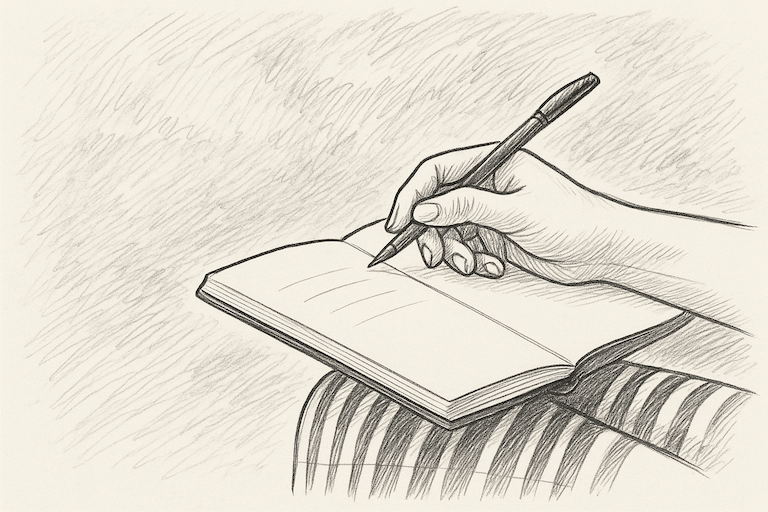Writing as a way of listening — a gentle daily practice for clearing the noise and meeting yourself on the page.
The Mind Is Noisy
The mind is noisy. Morning Pages are a way to clear that noise — three pages, first thing, before the day begins.
What Are Morning Pages?
Morning Pages, developed by Julia Cameron in The Artist’s Way, are a daily writing exercise designed to unblock creativity and foster self-awareness.
They’re a stream of consciousness on paper — three longhand pages written before the day starts.
You write whatever comes to mind, without censoring or editing.
Even if it’s “I don’t know what to write; this feels pointless,” — that’s what you write.
The process is as simple, and as profound, as that.
Why Morning Pages Matter
Each time we return to the page, something small reveals itself. Patterns emerge. Clarity deepens.
The practice builds trust — not in having all the answers, but in your ability to meet yourself honestly.
Morning Pages help us stay with what’s unfinished. They create space for what we’ve been carrying to shift into something more life-giving.
There’s no end goal — only the slow work of becoming clearer about what’s true.
And sometimes, when we can finally say something clearly enough, we find we’re no longer holding on to it quite so tightly.
How to Do Morning Pages
1️⃣ Write first thing in the morning.
Before checking messages or engaging with the world, give yourself this space to meet your own mind before it becomes crowded.
2️⃣ Write three pages by hand.
Julia Cameron insists on longhand for a reason:
“Velocity is the enemy. It takes longer to write by hand, and this slowness connects us to our emotional life.”
The slower rhythm invites the deeper voice beneath the surface chatter.
3️⃣ Don’t worry about grammar or structure.
Let it be messy. This is about honesty, not performance.
4️⃣ Don’t aim for art.
Morning Pages are not “art.” They are a clearing — a space to empty what’s been stored inside so that something new can move through.
5️⃣ Keep them private.
They’re for your eyes only. This privacy makes honesty possible.
6️⃣ Be consistent.
The magic happens over time. Some days will feel alive, others dull — both matter.
It’s the act of returning that builds trust.
7️⃣ Use them to explore or vent.
Write about what’s on your mind — your worries, hopes, lists, dreams. Over time, clarity deepens.
8️⃣ Don’t overthink it.
If you’re stuck, write about being stuck. Keep the pen moving. That’s the only rule.
Writing as a Way of Listening
In Parts on Paper, we call this writing as a way of listening.
The focus isn’t perfection — it’s hearing what’s actually there beneath the noise.
You might write something simple, like I take you as you were, Dad.
At first, they’re just words. But when you stay with them — day after day — something shifts.
Meaning unfolds, and what began as clutter becomes clarity.
This is the work — not forcing clarity, but allowing it to emerge through repetition and return.
What begins as scattered thoughts gradually becomes something you can see more clearly.
And in that seeing, something releases.
Clarity becomes its own reward.
Permission to Be Honest
Byron Katie says, “Judge your neighbour.”
It sounds strange, but it’s a permission slip for truth-telling.
Let yourself write the judgments you normally suppress — the person who irritates you, the friend who let you down, the family member who drives you mad.
Brené Brown calls this the SFD (Shitty First Draft) — and that’s exactly what Morning Pages are for.
When we write our judgments down, we can see them clearly instead of acting them out unconsciously.
Sometimes they’re valid; sometimes they turn around and reveal something about us.
Either way, they move from the shadows to the page — where they can breathe.
A Note on Community
Though Morning Pages are private, sharing the experience of the practice can be powerful.
In our Parts on Paper groups, each person writes alone — but reflecting together on what the practice brings up reminds us we’re not alone on the journey of self-discovery.
Final Thought
Let yourself watch the words pour out of your pen.
The more you do, the more you’ll see — you’re not really doing the writing.
Writing, like breathing, just happens.
You catch the current and let it flow.
What a strange and beautiful thing — to witness life pouring itself through you. 🌿
